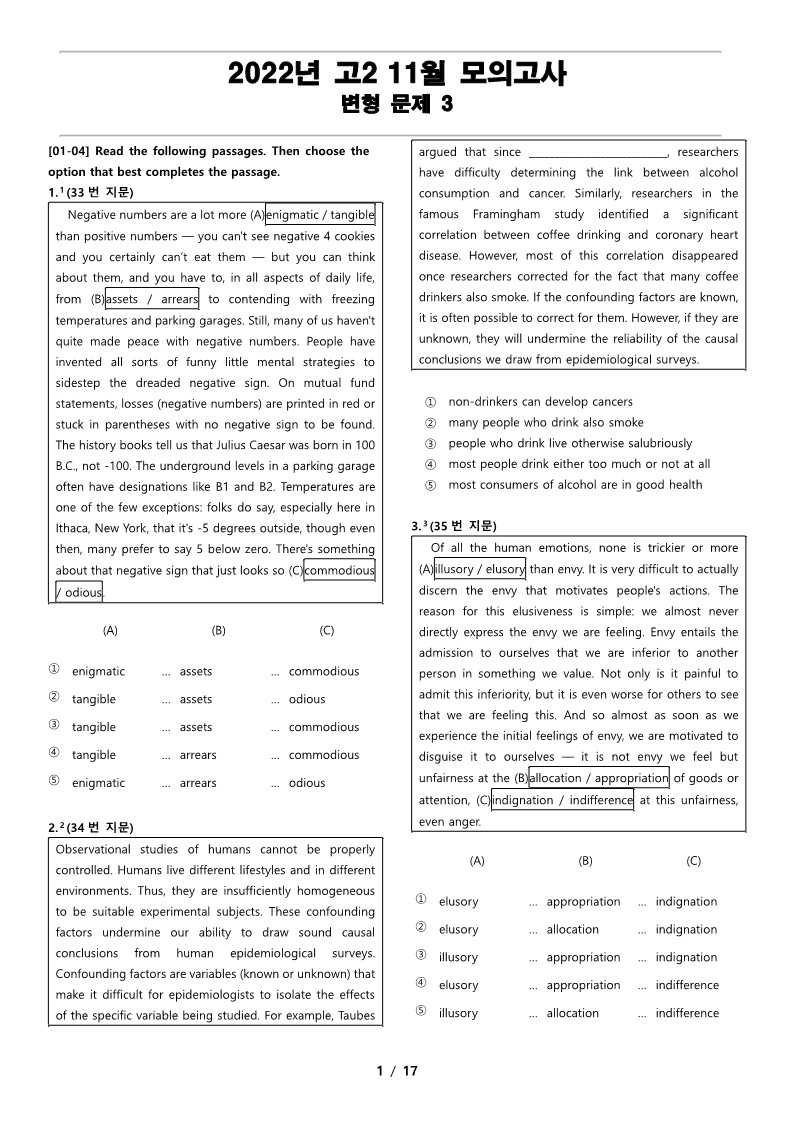2022년 고2 11월 전국 연합 모의고사
변형 문제 3
일반 워크북 형태의 문제에서 벗어나 The Makings가 만든
2022년 고2 11월 전국 연합 모의고사 변형 문제 3
출판사에서 오랫동안 영어 번역과 교정을 하셨던 원어민 선생님과
현직에서 강사를 하고 있는 연구진들이 학생들을 위한
최상의 2022년 고2 11월 전국 연합 모의고사 변형 문제 3 을 선보입니다.
사고력과 이해력을 요구하는 문제들로 내신 대비 뿐만이 아니라
수능도 한꺼번에 공부하실 수 있는 자료입니다.
중간고사&기말고사 전에 더메이킹스(The Makings)에서
제작한 2022년 고2 11월 전국 연합 모의고사 변형 문제로 마무리 하세요.
정답 확인 하러가기!
2022년 고2 11월 전국 연합 모의고사 변형 문제 3
2022년 고2 9월 전국 연합 모의고사 변형 문제, 내신대비, 영어내신자료,고등영어자료, 모의고사 변형문제,전국 연합모의고사 변형자료, 모의고사 영어 서술형 대비, 대치동 고등 영어자료, 대치
themakings.co.kr
themakings.co.kr
The Makings의 2022년 고2 11월 전국 연합 모의고사 변형 문제는
총 11개의 유형으로 구성되어 있습니다.
1. 빈칸 채우기(객관식)
2. 글의 내용 일치/불일치(객관식/한글 선택지)
3. 글의 내용 일치/불일치(객관식/영어 선택지)
4. 글 끼어 넣기(객관식)
5. 어법(서술형)
6. 어휘(서술형)
7. 주제문(객관식/영어 선택지)
8. 어휘 빈칸 채우기(서술형)
9. 영작(서술형)
10. 요약문 완성하기(서술형)
11. 문단 재배열 하기(객관식)
더메이킹스(The Makings)가 제작한 2022년 고2 11월 전국 연합 모의고사
변형 문제 3의 지문입니다.
1번 지문(문항 번호 33번)
Negative numbers are a lot more abstract than positive numbers ― you can't see negative 4 cookies and you certainly can’t eat them — but you can think about them, and you have to, in all aspects of daily life, from debts to contending with freezing temperatures and parking garages. Still, many of us haven't quite made peace with negative numbers. People have invented all sorts of funny little mental strategies to sidestep the dreaded negative sign. On mutual fund statements, losses (negative numbers) are printed in red or stuck in parentheses with no negative sign to be found. The history books tell us that Julius Caesar was born in 100 B.C., not -100. The underground levels in a parking garage often have designations like B1 and B2. Temperatures are one of the few exceptions: folks do say, especially here in Ithaca, New York, that it's -5 degrees outside, though even then, many prefer to say 5 below zero. There's something about that negative sign that just looks so unpleasant.
2번 지문(문항 번호 34번)
Observational studies of humans cannot be properly controlled. Humans live different lifestyles and in different environments. Thus, they are insufficiently homogeneous to be suitable experimental subjects. These confounding factors undermine our ability to draw sound causal conclusions from human epidemiological surveys. Confounding factors are variables (known or unknown) that make it difficult for epidemiologists to isolate the effects of the specific variable being studied. For example, Taubes argued that since many people who drink also smoke, researchers have difficulty determining the link between alcohol consumption and cancer. Similarly, researchers in the famous Framingham study identified a significant correlation between coffee drinking and coronary heart disease. However, most of this correlation disappeared once researchers corrected for the fact that many coffee drinkers also smoke. If the confounding factors are known, it is often possible to correct for them. However, if they are unknown, they will undermine the reliability of the causal conclusions we draw from epidemiological surveys.
3번 지문(문항 번호 35번)
Of all the human emotions, none is trickier or more elusive than envy. It is very difficult to actually discern the envy that motivates people's actions. The reason for this elusiveness is simple: we almost never directly express the envy we are feeling. Envy entails the admission to ourselves that we are inferior to another person in something we value. Not only is it painful to admit this inferiority, but it is even worse for others to see that we are feeling this. And so almost as soon as we experience the initial feelings of envy, we are motivated to disguise it to ourselves ― it is not envy we feel but unfairness at the distribution of goods or attention, resentment at this unfairness, even anger.
4번 지문(문항 번호 36번)
The right to be forgotten is a right distinct from but related to a right to privacy. The right to privacy is, among other things, the right for information traditionally regarded as protected or personal not to be revealed. The right to be forgotten, in contrast, can be applied to information that has been in the public domain. The right to be forgotten broadly includes the right of an individual not to be forever defined by information from a specific point in time. One motivation for such a right is to allow individuals to move on with their lives and not be defined by a specific event or period in their lives. For example, it has long been recognized in some countries, such as the UK and France, that even past criminal convictions should eventually be "spent" and not continue to affect a person's life. Despite the reason for supporting the right to be forgotten, the right to be forgotten can sometimes come into conflict with other rights. For example, formal exceptions are sometimes made for security or public health reasons.
'전국 연합 모의고사 변형 문제 > 고2 모의고사 변형 문제' 카테고리의 다른 글
| 2022년 고2 6월 전국 연합 모의고사 변형 문제 1 (0) | 2023.02.21 |
|---|---|
| 2022년 고2 11월 전국 연합 모의고사 변형 문제 4 (0) | 2022.12.05 |
| 2022년 고2 11월 전국 연합 모의고사 변형 문제 2 (0) | 2022.12.03 |
| 2022년 고2 11월 전국 연합 모의고사 변형 문제 1 (0) | 2022.12.01 |
| 2022년 고 2 6월 전국 연합 모의고사 변형 문제 4 (0) | 2022.10.12 |

